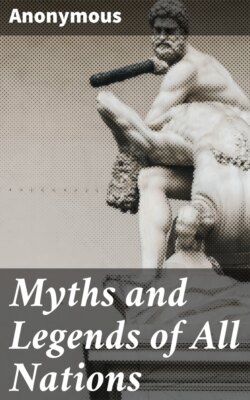Читать книгу Myths and Legends of All Nations - Anonymous - Страница 16
На сайте Литреса книга снята с продажи.
The Tenth Labor
ОглавлениеTable of Contents
When the hero laid the sword belt of Queen Hippolyta at the feet of Eurystheus, the latter gave him no rest, but sent him out immediately to procure the cattle of the giant Geryone. The latter dwelt on an island in the midst of the sea, and possessed a herd of beautiful red-brown cattle, which were guarded by another giant and a two-headed dog.
Geryone himself was enormous, had three bodies, three heads, six arms and six feet. No son of earth had ever measured his strength against him, and Hercules realized exactly how many preparations were necessary for this heavy undertaking. As everybody knew, Geryone's father, who bore the name "Gold-Sword" because of his riches, was king of all Iberia (Spain). Besides Geryone he had three brave giant sons who fought for him; and each son had a mighty army of soldiers under his command. For these very reasons had Eurystheus given the task to Hercules, for he hoped that his hated existence would at last be ended in a war in such a country. Yet Hercules set out on this undertaking no more dismayed than on any previous expedition.
He gathered together his army on the island of Crete, which he had freed from wild animals, and landed first in Libya. Here he met the giant Antaeus, whose strength was renewed as often as he touched the earth. He also freed Libya of birds of prey; for he hated wild animals and wicked men because he saw in all of them the image of the overbearing and unjust lord whom he so long had served.
After long wandering through desert country he came at last to a fruitful land, through which great streams flowed. Here he founded a city of vast size, which he named Hecatompylos (City of a Hundred Gates). Then at last he reached the Atlantic Ocean and planted the two mighty pillars which bear his name.
The sun burned so fiercely that Hercules could bear it no longer; he raised his eyes to heaven and with raised bow threatened the sun-god. Apollo wondered at his courage and lent him for his further journeys the bark in which he himself was accustomed to lie from sunset to sunrise. In this Hercules sailed to Iberia.
Here he found the three sons of Gold-Sword with three great armies camping near each other; but he killed all the leaders and plundered the land. Then he sailed to the island Erythia, where Geryone dwelt with his herds.
As soon as the two-headed dog knew of his approach he sprang toward him; but Hercules struck him with his club and killed him. He killed also the giant herdsman who came to the help of the dog. Then he hurried away with the cattle.
But Geryone overtook him and there was a fierce struggle. Juno herself offered to assist the giant; but Hercules shot her with an arrow deep in the heart, and the goddess, wounded, fled. Even the threefold body of the giant which ran together in the region of the stomach, felt the might of the deadly arrows and was forced to yield.
With glorious adventures Hercules continued his way home, driving the cattle across country through Iberia and Italy. At Rhegium in lower Italy one of his oxen got away and swam across the strait to Sicily. Immediately Hercules drove the other cattle into the water and swam, holding one by the horns, to Sicily. Then the hero pursued his way without misfortune through Italy, Illyria and Thrace to Greece.
Hercules had now accomplished ten labors; but Eurystheus was still unsatisfied and there were two more tasks to be undertaken.
